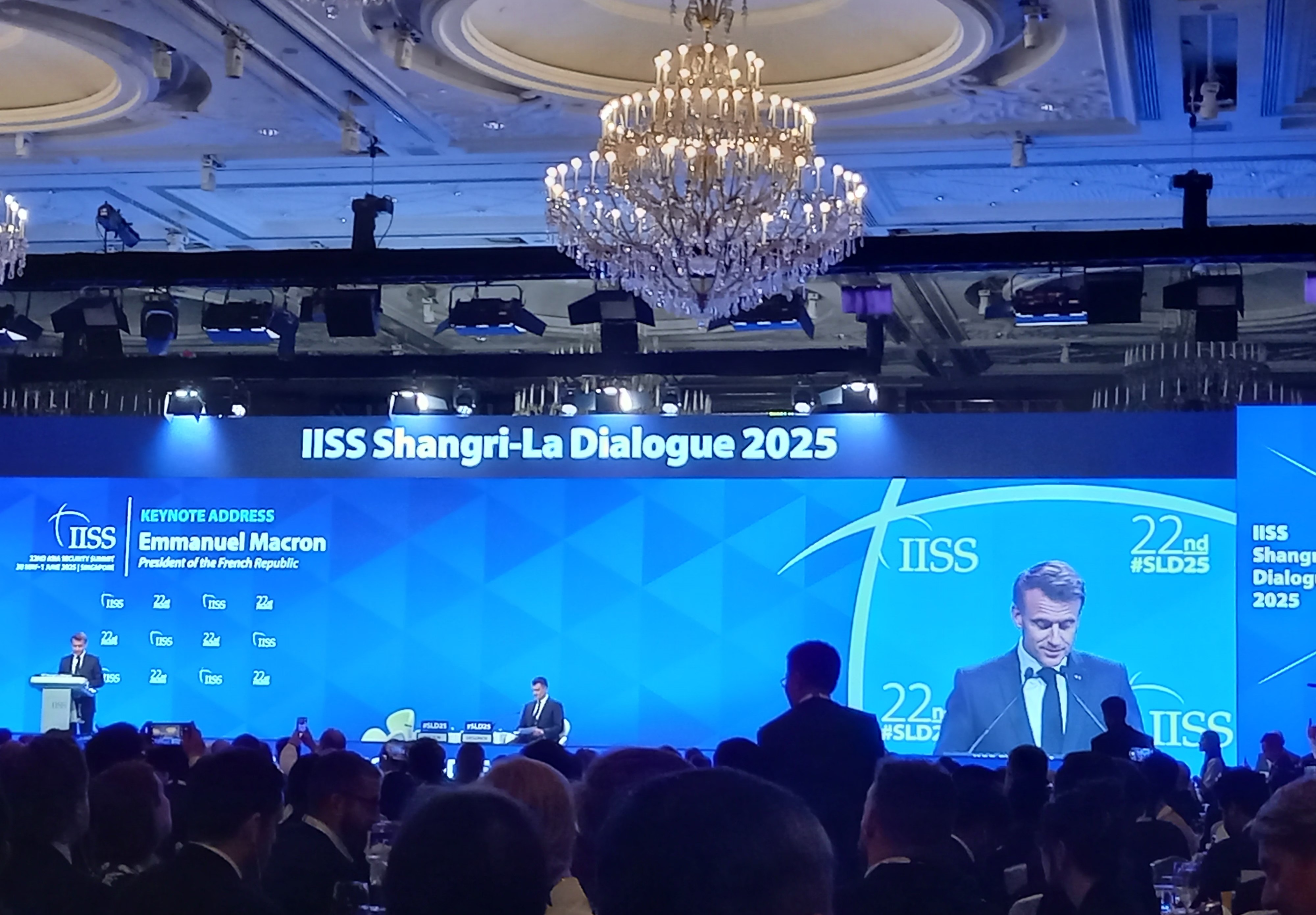France seeks third way between US and China in Southeast Asia

The French leader sent a message of partnership but gave few concrete details on sustained engagement plans.

French President Emmanuel Macron’s recent visit to Southeast Asia – Vietnam, Indonesia, and culminating in a landmark address at the Shangri-La Dialogue in Singapore – offered a glimpse into France’s evolving Indo-Pacific strategy as well as his broader geopolitical vision.
As the first European head of state to deliver the keynote speech at Asia’s premier security forum, Macron seized the opportunity to present France as a constructive power, one committed to upholding international law, wary of great power polarisation, and aligned with the region’s aspirations for sovereignty and strategic autonomy.
The core message was that Europe and Asia share similar challenges: they face common threats from revisionist powers that reject international law and use coercion. He presented the two theatres as closely interrelated. The Ukraine war has global stakes – it tests the world order, sovereignty, and non-proliferation, with direct implications for Asia through growing Russia-China-North Korea ties.
Seizing the strategic moment
To resist the “sphere of coercions” carried out by illiberal hegemonic powers, Macron called for a coalition of independence, grounding his appeal to strategic autonomy in both Asian history and strategic culture, and a Gaullist legacy. He invoked the memory of the 1955 Bandung Conference and General Charles de Gaulle’s 1966 Phnom Penh speech that positioned France as a partner for countries striving to avoid alignment with major blocs.
France’s careful balancing act – at times criticised for its ambiguity – is largely welcomed in the region. Macron combines frank criticism of China with a commitment to dialogue. In May, China’s Defence Minister Dong Jun met his French counterpart in Paris, even as Dong’s absence from the Shangri-La Dialogue drew widespread attention.
However, this attempt to propose a “third way” between rival blocs should come with a reality-check. The waning influence of Europe in Asia is clear, suffering from perceptions of double-standards, institutional complexities and wavering commitment to the region. [...]
Seizing economic moment
This outreach also reflects a recognition that the Association of Southeast Asian Nations is vital to Europe’s – and France’s – economic and security future. The organisation encompasses strategic maritime routes crucial for global trade and provides resources essential for Europe’s green and digital transitions. At the Indo-Pacific level, Macron called for a trade agreement between the European Union and the Comprehensive and Progressive Agreement for Trans-Pacific Partnership (CPTPP) to help shape global standards for trade, labour, and the environment.[...]
Gaps in vision
Despite the strong rhetorical alignment on offering a third way, Macron’s vision still lacks operational clarity. While the French President stressed the need for European-Asian cooperation, he offered little detail into what France’s updated Indo-Pacific strategy, set to be released in the coming weeks, will actually encompass. Nor did he explain how France intends to maintain its efforts in the region amid an ongoing war in Europe and with the United States retreating. [...]
Macron’s ambition to build a “third way” as a rules-based, non-aligned, and cooperative order has intuitive appeal in Southeast Asia. But it now requires activation. For this vision to move beyond rhetoric, France must demonstrate sustained regional engagement, concrete projects and actionable initiatives.
> Read the entire article on The Interpreter.

Available in:
Themes and regions
Share
Related centers and programs
Discover our other research centers and programsFind out more
Discover all our analysesJapan’s Takaichi Landslide: A New Face of Power
Prime Minister Sanae Takaichi has turned her exceptional popularity into a historic political victory. The snap elections of February 8 delivered an overwhelming majority for the Liberal Democratic Party (LDP), driven by strong support from young voters, drawn to her iconoclastic and dynamic image, and from conservative voters reassured by her vision of national assertiveness. This popularity lays the foundation for an ambitious strategy on both the domestic and international fronts.
The U.S. Policy Toward Taiwan Beyond Donald Trump: Mapping the American Stakeholders of U.S.-Taiwan Relations
Donald Trump’s return to the White House reintroduced acute uncertainty into the security commitment of the United States (U.S.) to Taiwan. Unlike President Joe Biden, who repeatedly stated the determination to defend Taiwan, President Trump refrains from commenting on the hypothetical U.S. response in the context of a cross-Strait crisis.

China’s Strategy Toward Pacific Island countries: Countering Taiwan and Western Influence
Over the past decade, China has deployed a diplomatic strategy toward the Pacific Island Countries (PICs). This strategy pursues two main objectives: countering Taiwan's diplomatic influence in the region and countering the influence of liberal democracies in what Beijing refers to as the "Global South."

Opening up the G7 to South Korea to Address Contemporary Global Challenges
The G7’s global influence has diminished as powers like China reshape international governance through initiatives such as BRICS and the Shanghai Cooperation Organisation (SCO). With the G7 now representing just 10 per cent of the world’s population and 28 per cent of global GDP, its relevance is increasingly questioned.










